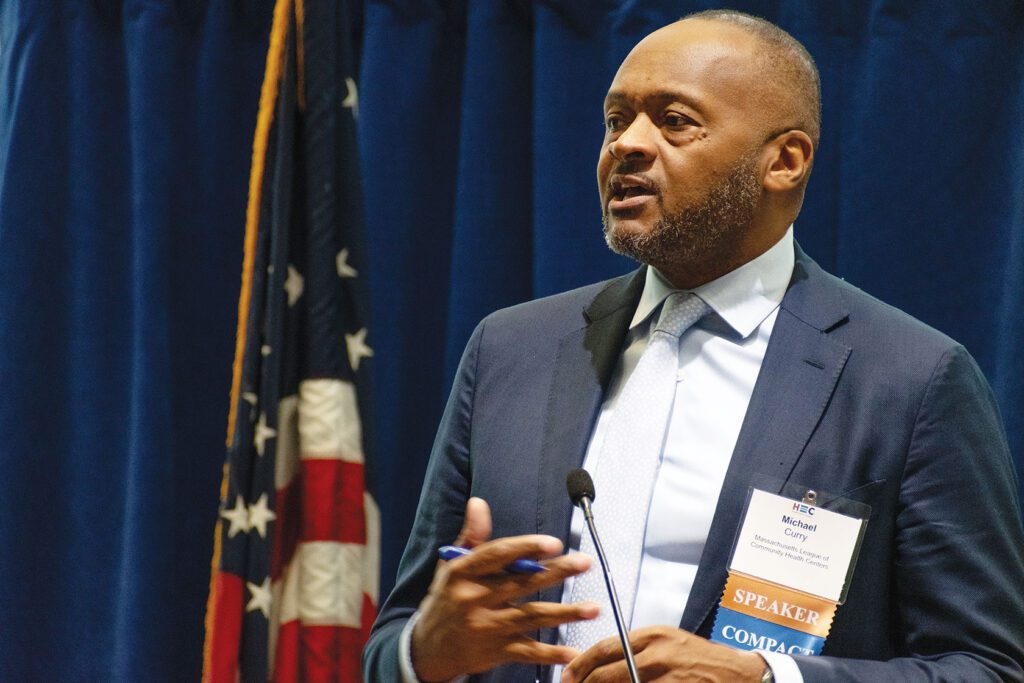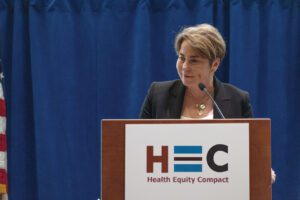Health leaders, state officials propose bold health equity goals
More than 80 leaders of color meet to discuss disparities in care standards

Leaders in health-related fields called for increased collaboration and broad structural change at the second annual Health Equity Trends Summit on June 6.
“We recognize that we are all in this together. Systemic change towards equity benefits everybody, with lower health care costs, improved standards of care and more vibrant communities,” said Michael Curry, president and CEO of the Massachusetts League of Community Health Centers, during welcome remarks.
The event, held at the University of Massachusetts Boston, was hosted by the Health Equity Compact, a coalition of more than 80 leaders of color in health care and related fields. The group first formed in 2022 to address equity concerns related to care for people of color in the commonwealth; Curry is a co-founder of the group.
Statewide, statistics around health care equity and access leave room for improvement. The Compact highlighted 2023 data from the Boston Public Health Commission that found the average life expectancy in Roxbury lags more than 20 years behind the average life expectancy in Back Bay.
A state Department of Public Health report from 2023 found that Black people were 2.5 times more likely to have serious health problems or die when having a baby compared to their white counterparts.
Addressing those numbers will take a joint effort, said Dr. Bisola Ojikutu, executive director of the Boston Public Health Commission and a member of the Health Equity Compact, during a panel about local efforts to close the city’s life expectancy gap.
“We know that with these big-picture issues of life expectancy, issues of premature mortality, it’s not just about what happens in the health care system. We’re talking about the upstream drivers … we’re talking about structural racism and systemic inequity,” she said. “If we really want to create change, we really want to turn the dial, can we do this alone? No, we can’t work in the silos that have been created. This is in need of an all-of-society approach.”

Department of Public Health Commissioner Dr. Robbie Goldstein, Secretary of Labor and Workforce Development Lauren Jones, and Secretary of Economic Development Yvonne Hao speak on a panel about state efforts to address health equity at the Health Equity Trends Summit, June 6. BANNER PHOTO
During the panel, she mentioned an upcoming city initiative, which she said the Commission plans to launch later this summer, to bring together groups and stakeholders across silos to address life-expectancy disparities and to provide Boston residents with more tangible support in the short term.
“We have to get those root-cause drivers addressed, but we also have to have pathways to address the downstream outcomes,” she said. “We want people to be able to turn around and have something in their pocket that reduces the stress and therefore reduces the blood pressure, but longer-term, we also want them to make sure that they’re connected to care, and they have physicians, they have access, and all of those pieces that have to flow together.”
A ‘whole-of-government approach’
Across government, too, leaders are looking to collaborate. A state effort called Advancing Health Equity in Massachusetts — or AHEM — is anchored in the state’s Executive Office of Health and Human Services but is meant to cross secretariat lines to other parts of the administration in an effort to close racial, economic and regional disparities in health outcomes. It’s part of what Governor Maura Healey called a “whole-of-government approach” during remarks at the summit.
AHEM has two main focus areas, one on maternal health and the other on social determinants of health — factors like food and housing access that impact health but are not directly part of a medical system — especially in relation to cardiometabolic diseases like heart attack, stroke and diabetes.
AHEM has set a clear agenda in its first year, especially around its focus on maternal health, with goals centered on changing the regulations around birthing centers to increase access and expanding the doula workforce, said Dr. Robbie Goldstein, commissioner of the Massachusetts Department of Public Health, who co-chairs the initiative.
“We’ve really set out aggressive goals to get these things done in the first year, and I actually think we’re going to accomplish all of them within the first year of AHEM,” he said.
The inter-agency collaboration is even more important in the initiative’s work around the social determinants of health, where things like food access and the built environment in communities may fall partially under control of Health and Human Services, but often require input and efforts from other offices in the administration, Goldstein said.
“We know that while that all has an impact on health, the Executive Office of Health and Human Services cannot control all of that, so we need to reach out to the other secretariats and make sure that we’re doing this hand in hand,” he said.
Healey said the effort is especially impactful given the lofty reputation of Massachusetts’ hospitals and life sciences industry.
“In light of this global leadership, it is all the more important and absolutely unacceptable that vulnerable people and communities right here in our own state still struggle with access to high-quality, affordable care,” Healey said. “This cannot continue, and that’s why we’ve made closing these disparities and achieving health equity a top priority for our state and our policies and across what we do.”
Legislation
Also at the state level, the Compact outlined priorities in the legislature, including a focus on a health equity bill that is currently moving through the State House.
That bill, if passed, would create a new state Office of Equity, with goals like standardizing the use of health equity data metrics across the state, addressing the cost burden of some medications and improving access to MassHealth.
Healey also highlighted her Mass Leads legislation, a $3.5 billion economic development bill that would, among other things, include a 10-year reauthorization of the state’s life sciences initiative.
That program, originally a product of former Governor Deval Patrick’s administration in 2008, created the quasi-public Massachusetts Life Sciences Center, which has a focus on supporting and expanding the biotechnology industry in the state. In 2018, it was reauthorized for five years by then-Governor Charlie Baker.
At the summit, Healey said the newest reauthorization, if approved, would also include a specific focus on equity, elevating it as a priority in work around life sciences research, workforce, access and outcomes.
“Across the board, we know that health equity is the key to systemic improvement,” said Healey, pointing to efforts during the COVID-19 pandemic that closed vaccination gaps and put Massachusetts near the top for uptake rates nationwide.

Governor Maura Healey delivers welcoming remarks. In her address, Healey touted her proposed Mass Leads act, which would invest in life sciences statewide, including an increased focus on equity efforts. BANNER PHOTO
During a panel featuring state leaders, Yvonne Hao, the state’s secretary of economic development, said the $1 billion the bill proposes in reauthorizing the life sciences Initiative would continue to support things like drug discovery but also would direct the state to think more holistically about health care.
“How do we not just have the best drug discovery, but make sure it gets to everybody as quickly as possible so that we close these life expectancy gaps?” Hao said. “If we can lead in every other way — if we can be the first state to have universal health care, the first state to have equality in marriage, the first state to have so many awesome things — can we be the first state to actually be the best at health care?”
Technology and AI
Beyond governmental efforts, the summit also looked toward new technological horizons, with a panel focused on artificial intelligence and its potential to impact equity in health systems.
Beyond the sci-fi-esque dreams of being able to have a discussion with an AI to diagnose an individual patient, Dr. Renee Crichlow, chief medical officer at Codman Square Health Center and a member of the Health Equity Compact, said the technology could be used to change systems and streamline internal processes in a way that could mean more dollars being spent on patient care, rather than going toward things like a billing department.
“The fact is, if you look at the way we spend our health care dollars, that’s where we’re going to have impact, when we have a practice redesign when we empower primary care at the level of the clinic,” Crichlow said.
But the hope for what the developing technology could bring also comes with concerns, especially around a tool that has the potential to augment existing disparities in the health care system.
Much of the concern comes from the fact that artificial intelligence is trained and works on sets of existing data, so any predictions it makes will be based on what things already look like. Marzyeh Ghassemi, an associate professor at MIT who has worked at the intersection of health and AI, said that leaves a huge gap between what AI should do to effect change and what it will do.
“It’s not being used as a transformative, ‘let me help you fly’ technology. It’s saying, ‘give me all the data about how your hospital operates now and I will do it faster and more efficiently for you, with less human oversight,” she said.
She pointed to the health insurance company Cigna, which developed an algorithm that allows it to deny large batches of claims at a time without review by a medical professional. That algorithm is now at the center of a class action lawsuit.
Speakers on the panel also advocated for greater participation of people of color in the development of the technology and learning models.
They pointed to research like Gender Shades, an MIT study that finished work in 2020 that found large gaps between how facial recognition algorithms performed with variations in skin color and gender. That study found an error rate of less than 1% for lighter-skinned men, but one of almost 35% percent for darker-skinned women.
“If we are participating in the development, we must make sure that the product that we’re going to use is developed on the population that it’s going to serve,” Crichlow said. “We have to be not only a part of the creation, but we have to be a part of the people who are doing the creation.”






